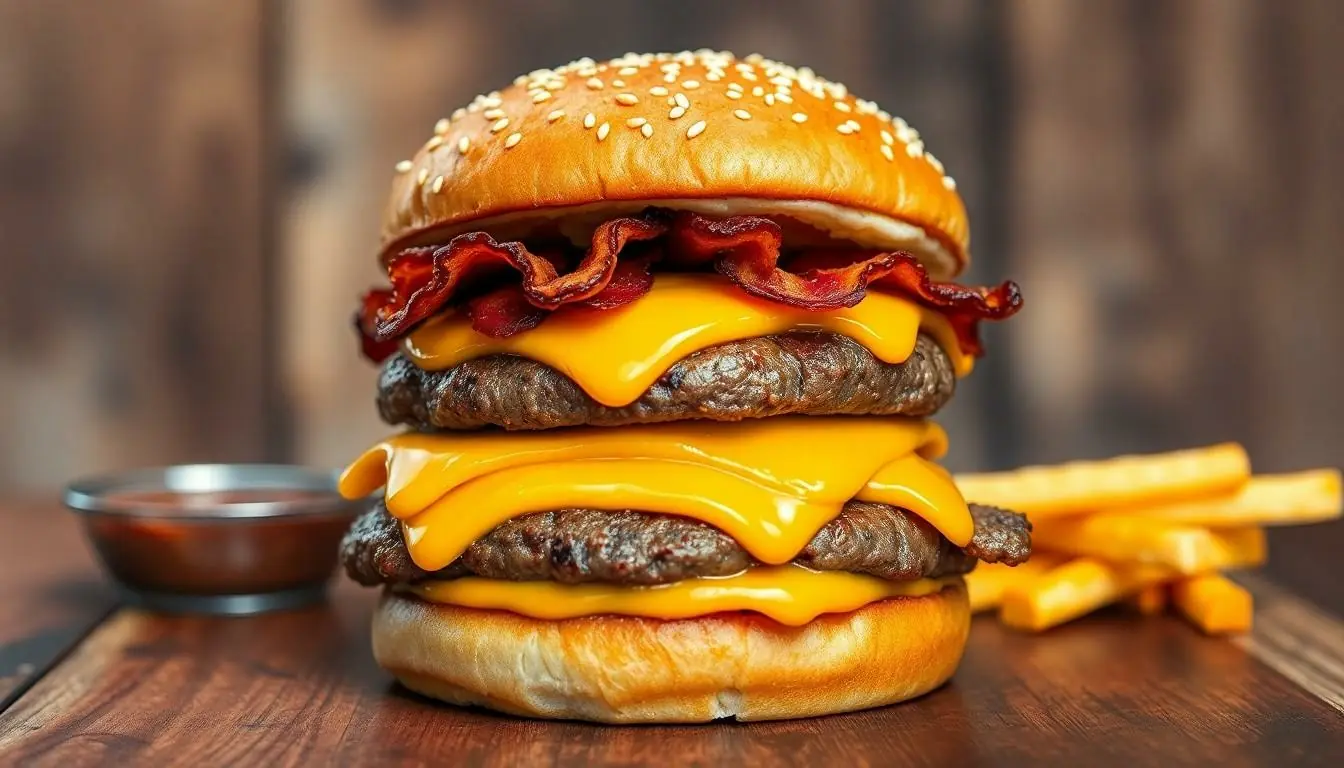When it comes to burgers, the Bacon King reigns supreme, but what about its nutritional crown? This meaty marvel packs a punch that can make even the most dedicated health nut raise an eyebrow. With layers of crispy bacon and juicy beef, it’s a feast for the senses, but it also comes with a side of questions about its nutritional value.
Table of Contents
ToggleOverview of Bacon King Nutrition
Bacon King boasts a combination of flavors, but its nutritional profile raises concerns. Each Bacon King contains approximately 1,150 calories, making it a high-calorie meal choice.
Fat content measures around 80 grams with 30 grams classified as saturated fat. This amount exceeds recommended daily limits for saturated fat intake. Protein comes in at 68 grams, which benefits muscle repair and growth but contributes significantly to overall calorie content.
Sodium levels can reach 1,500 milligrams, presenting potential risks for individuals monitoring their salt intake. High sodium consumption links to increased blood pressure and cardiovascular issues.
Carbohydrate content registers at 48 grams, primarily from the bun and toppings. Dietary fiber is quite low, providing only 3 grams. This minimal fiber can lead to quicker digestion and less satiety.
Vitamins and minerals are present, but in limited amounts. Iron provides about 20% of the daily value, supporting energy levels and overall health. However, essential nutrients like vitamin C and certain B vitamins lag behind in quantity.
Overall, the Bacon King excels in taste but lacks balance in nutritional value. Those considering this meal should keep these factors in mind while making food choices. Balancing indulgence with healthier options can optimize dietary habits.
Nutritional Breakdown

The Bacon King offers a rich mix of flavors, but its nutrition profile raises important considerations. Understanding its nutritional content helps consumers make informed choices.
Calories and Macros
A Bacon King contains approximately 1,150 calories, making it a calorie-dense option. It features around 80 grams of fat, including 30 grams of saturated fat, which is more than the recommended daily intake for many. Protein content sits at 68 grams, contributing to its high energy value. Additionally, the burger has 48 grams of carbohydrates, primarily sourced from the bun and toppings. Only 3 grams of dietary fiber exist, leading to potential issues with satiety and digestion.
Vitamins and Minerals
Vitamins and minerals present in the Bacon King include iron, an essential nutrient. Iron plays a vital role in transporting oxygen throughout the body. While the burger does provide some nutrients, it lacks key vitamins like vitamin C and certain B vitamins. These deficiencies might impact overall health if consumed regularly. Therefore, balance in one’s diet remains crucial, especially when indulging in such a rich menu item.
Ingredients Analysis
The Bacon King burger includes various components that impact its overall nutritional profile. Analyzing these ingredients reveals important details for consumers.
Meat Quality
Beef constitutes the primary protein source in the Bacon King. The quality of this beef varies, with fast-food establishments typically using ground beef of mixed grade. Ground beef often contains higher fat content, which contributes to the burger’s overall richness and flavor. Crispy bacon enhances the meat experience, but the fat from both the beef and bacon elevates calorie intake significantly. Each Bacon King contains approximately 80 grams of fat, including 30 grams of saturated fat, far exceeding daily recommendations. Opting for leaner cuts of meat could improve nutritional balance while reducing unhealthy fat levels.
Additives and Preservatives
Processed ingredients feature prominently in the Bacon King. Added preservatives aim to enhance shelf life and flavor, such as sodium nitrite commonly found in bacon. These additives, while effective for preservation, can contribute to higher sodium levels. The burger contains around 1,500 milligrams of sodium, posing potential health risks when consumed frequently. Artificial flavors and colorings may also be present, increasing concerns over long-term health effects. Reading ingredient labels becomes essential for those wishing to avoid processed additives often linked to adverse health outcomes.
Health Considerations
The Bacon King burger combines rich flavors with specific health impacts worth examining. Understanding both the potential benefits and drawbacks helps consumers make informed dietary choices.
Potential Health Benefits
High protein content in the Bacon King supports muscle growth and repair. With 68 grams of protein, it offers a substantial protein intake, beneficial for individuals engaging in regular physical activity. Iron found in the burger aids in energy production and oxygen transport within the body. This nutrient plays a critical role in maintaining overall vitality, especially for those with increased needs, like athletes. Lastly, the inclusion of bacon may provide small amounts of essential fatty acids, which contribute to heart health when consumed in moderation.
Nutritional Drawbacks
Caloric content presents a major concern, with each Bacon King containing approximately 1,150 calories. Consuming excessive calories can lead to weight gain and other health issues. High saturated fat content, about 30 grams, increases the risk of heart disease and cholesterol problems. Sodium levels reach 1,500 milligrams, which can contribute to hypertension for individuals with specific health conditions. Limited dietary fiber, only 3 grams in the burger, causes rapid digestion and less feeling of fullness, potentially prompting overconsumption. Regularly indulging in this burger may lead to nutrient imbalances, with a lack of essential vitamins like vitamin C and B vitamins.
Comparison with Other Fast Food Items
The Bacon King’s caloric content is notably higher than many other fast food burgers. For example, McDonald’s Big Mac contains around 550 calories, while Wendy’s Dave’s Single offers approximately 1,080 calories. In contrast, the Bacon King stands at about 1,150 calories, placing it at the top of the calorie spectrum.
High-fat content is another factor for comparison. The Bacon King has around 80 grams of fat, including 30 grams of saturated fat. Most fast food burgers average about 30 to 50 grams of total fat. This significant difference makes the Bacon King a less appealing option for those monitoring fat intake.
Regarding protein, the Bacon King packs 68 grams. This amount exceeds protein content of other burgers like Carl’s Jr.’s Western Bacon Cheeseburger, which features around 30 grams. High protein is beneficial for muscle repair, yet its high calorie count limits its overall health benefits.
Sodium levels also warrant attention. The Bacon King’s sodium content can reach 1,500 milligrams, significantly higher than alternatives such as Wendy’s Junior Cheeseburger Deluxe, which has about 700 milligrams. Excessive sodium calories over time contribute to risks of hypertension and heart disease.
Analyzing carbohydrate and fiber content reveals further contrasts. The Bacon King contains 48 grams of carbohydrates but only 3 grams of dietary fiber. Comparatively, items like Subway’s 6-inch Turkey Breast sandwich provide 3 times the fiber, promoting better digestive health.
When considering vitamins and minerals, fast food options vary widely. The Bacon King contains some iron but lacks essential nutrients like vitamin C. Other items, such as salads or wraps, typically offer a broader range of vitamins, supporting overall health and wellness.
The Bacon King burger is undeniably a flavorful choice but comes with significant nutritional drawbacks. Its high calorie and fat content can pose risks for those mindful of their health. With elevated sodium levels and limited dietary fiber, it’s clear that moderation is key when indulging in this fast-food option.
For individuals aiming for a balanced diet, considering healthier alternatives might be a wise decision. While the Bacon King offers some benefits like protein and iron, the potential long-term health implications of regular consumption shouldn’t be overlooked. Making informed choices about meals can lead to better overall health and well-being.





